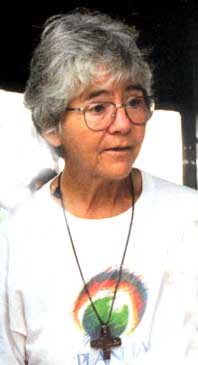The rancher suspected of ordering the killing of an American nun in the Brazilian Amazon has been arrested and detained at his home in the state of Pará, reports the Associated Press (AP).
The detention of Regivaldo Galvao could lead prosecutors to reopen the case in the slaying of Dorothy Stang, a nun killed in 2005 during a dispute over land. Stang had sought to protect the land as a sustainable use reserve for the poor while developers wanted to clear the land for cattle pasture.
Stang was gunned down by a gunman allegedly hired by Galvao and Vitalmiro Moura, another rancher. Moura was convicted last year to 30 years in prison, but the sentence was overturned this year after gunman Rayfran das Neves Sales claimed to have acted alone in killing Stang. Sales was sentenced to 28 years in prison.
 Dorothy Stang, 1931 – 2005 Editor’s note: Dorothy Stang, an American nun who spent more than 30 years fighting for land rights for poor settlers in the Amazon, was murdered by a contract killer in February 2005 in the Brazilian state of Para. Stang, 73, was shot six times with a revolver as she read from the Bible.
Stang, a member of the Order of the Sisters of Notre Dame de Namur, was working with the Pastoral Land Commission, a Catholic Church group that lobbies for land reform in Brazil and fights for land rights for the poor, when she was gunned down. Stang’s murder was a tipping point in the heated battle between the rural poor and large landowners in the state of Para. The federal government responded to her killing by sending several thousand armed troops into the state. Later Brazil established several protected areas in contested forests and proposed a land-use permit system for selling concession to loggers who agreed to set side land for settlers and indigenous groups. |
Galvao was originally arrested in 2005 but used appeals to avoid trial and jail time. However his actions in November of this year may have hurt his case, according to the AP.
-
Galvao has denied any role in Stang’s death, arguing he had no interest in the lands Stang was defending.
But prosecutors say that in November he went before Brazil’s Incra land reform agency to present documents showing he owns the disputed land and wants it back — casting doubt on one of his main alibis.
Prosecutor Felicio Pontes told the AP in November that the land where Stang was killed is public property, and if Galvao claimed to own it, the case against him could be reopened.
Deforestation in the Brazilian Amazon is primarily driven by industrial interests — loggers, ranchers, and large-scale agriculture. Typically exploitation begins with loggers who harvest valuable timber from a forest area. The remaining trees are cut and the land is burned for use as pasture or for crops.
Amazon forest loss in Brazil rose slightly in 2008, but degradation — the precursor to clearing — climbed substantially (67 percent) as developers moved to take advantage of record high commodity prices. Prices have since retreated.







